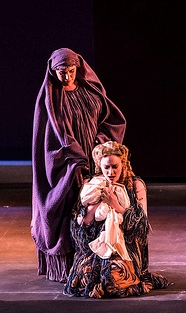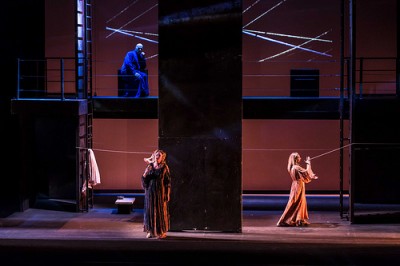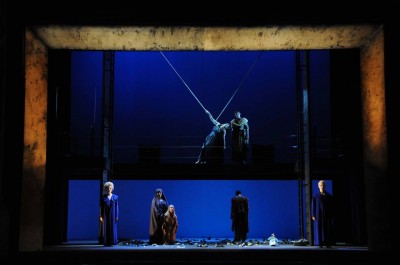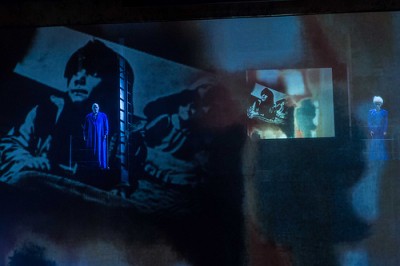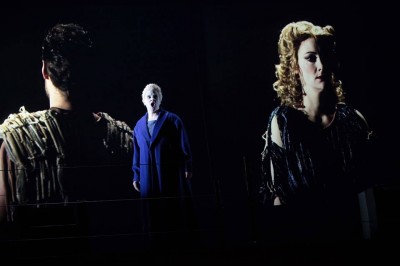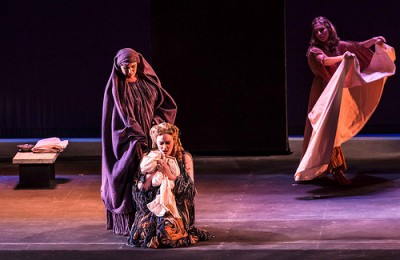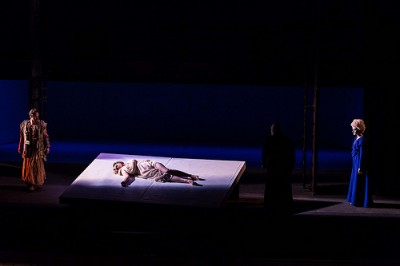THE RAPE OF LUCRETIA in Florence
Benjamin Britten: THE RAPE OF LUCRETIA
Florence, Italy, Teatro Goldoni, 2013, may 21st, conducted by Jonathan Webb
Review by Fabio Bardelli, photos Maggio Musicale Fiorentino, Firenze
FLORENCE:2013 is the year of Verdi and Wagner celebrations, but another important anniversary cannot be forgotten: it’s one hundred years since Benjamin Britten’s birth
. In fact he was born in Lowestoft, Suffolk, in 1913 and died in 1976 in Aldeburgh.
The Rape of Lucretia isn’t among his best known and more often performed operas. It was staged for the first time just after the end of Word War II, in 1946 in Glyndebourne. Britten wrote it following the libretto that Roland Duncan took from previous dramas by Shakespeare, André Obey and Tito Livio, and it’s about the rape of Lucretia, Collatinus’ wife, executed by Prince Tarquinius who was Etruscan by birth
.
The Rape of Lucretia is a chamber opera, the orchestra is made only by twelve musicians
. It is seldom heard in Italy, where Britten’s more often performed operas are Peter Grimes, Billy Budd and The turn of the screw. Its subject is particularly near to the composer’s sensivity, like it happens for other of his operas, because the violence on the individual is one of the fundamental themes of his works (everyone knows very well Britten’s deep partecipation to the story of Peter Grimes, oppressed by the village of right-minded persons).
The theme of violated innocence is even autobiographical, and is a fundamental element in Britten’s production even if many-sided (and in The Rape of Lucretia the musician uses the interesting libretto by Ronald Duncan telling a story of Ancient Rome.) An important exemple of Britten’s sympathetic attitude is the Finale of this opera, where Male and Female Chorus, making a clear parallelism among the story of the opera and the Redemption of the world by Jesus Christ, sing the words (in a very pessimistic way but also with a great trust in Art) “Since Time commenced or Life began Great Love has been defiled by Fate or Man. Now with worn words and these brief notes we try to harness song to human tragedy.”
I think, and this is only my personal opinion, that Benjamin Britten wrote masterpieces bigger than this one, but I’m really happy that in this celebrative year The Rape of Lucretia is performed once more, reprising the first (and only in Florence) staging by Daniele Abbadothat we saw in Teatro Goldoni in 2001, even if with different singers.
First of all I must say that the reduction of the instruments to only twelve players isn’t a limit for Britten’s phantasy and for his very sensitive orchestral writing. On the contrary, it seems almost to take part in the action enveloping wonderfully the voices. The orchestra was very well conducted by Jonathan Webb, able to combine stage’s needs with a passionate but bright rendering, always very careful to nuances of the score, both to colours and to harmonic subtilities.
Daniele Abbado‘s staging (with scenes, costumes and light designing by Gianni Carluccio, and videos by Luca Scarzella) with its numerous projections and colours, seems almost to put the music and the plot in second row: actually the story is very linear and would need a less vivaciously coloured and disturbing staging.
The scene is divided horizontally in two parts, in the lower part the historical character are acting, in the upper one generally Male and Female Chorus, each composed, as it’s well known, by only a person: they are a sort of a last legacy of Greek Tragedy, or even an “alter ego” of the musician and of his deep “pietas”. So he gives them his own opinions and compassion to the characters. The Chorus is also a dramatic occasion for references, with no temporal connection to the historical plot, to Faith and Christianity.
The various characters, wonderfully depicted by Britten, get an incredible stage depth thanks to the good acting of the singers in this composite performance. The conflict among the characters is not politic (Latins against Etruscans) but it is a deep rooted in their souls, so I would have preferred a more moderate use of impressive projections, very often of no utility and invasive, as it happens with these unceasingly images on the veiled courtain and on the stage of archeologic founds, abstract lines, photos of concentration camps to show the atemporality of the plot and so on.
The singers were working well together and generally the cast was of a good level. Lucretia was Yulianne Young, with an interesting voice and stage personality, who creates an innocent but even passionate and determined character. Her voice is a little inhomogeneous and her interpretation shows some small interpretative excess, that probably doesn’t accord too much with Britten’s writing.
Rather well were, both musically and scenically, Gabriella Sborgi as Bianca and Laura Catrani as Lucia.
About male characters, I must praise the very good professionism of Jacques Imbrailo as Prince Tarquinius boid on the scene and vocally irreprehensible. Also the other male characters, Thomas Tatzl as Collatinus and Philip Smith as Junius, gave a good performance.
The two singers who performed the Male and Female Chorus deserve a separate discussion
. Male Chorus was written by Britten for the particular vocal charasteristics of Peter Pears: actually it sounds not unlike Peter Grimes or Captain Vere. Tenor Gordon Gietz has a very correct way of singing this part, even lacking in vocal volume, but has a really correct and partecipative way of singing. Rather correct was also Susannah Glanville as Female Chorus.
Teatro Goldoni was filled up and the performance had a great success by the audience.
Review by Fabio Bardelli
translation from italian Bruno Tredicine
Direttore, Jonathan Webb
Regia, Daniele Abbado
Scene, costumi e luci, Gianni Carluccio
Video, Luca Scarzella
Cast:
Male Chorus, Gordon Gietz
Female Chorus, Susannah Glanville
Collatinus, Thomas Tatzl
Junius, Philip Smith
Prince Tarquinius, Jacques Imbrailo
Lucretia, Julianne Young
Bianca, Gabriella Sborgi
Lucia, Laura Catrani
Orchestra del Maggio Musicale Fiorentino

